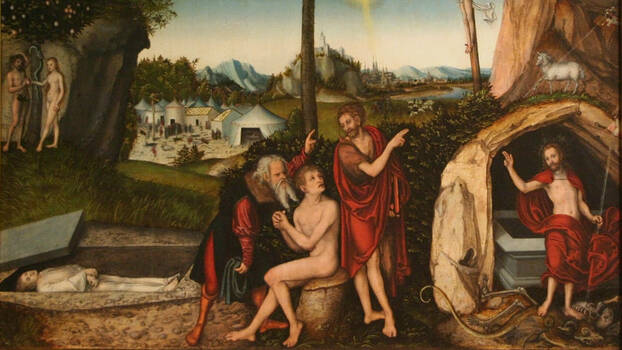
The actual term “church from below”, at least in German-language discourse on the subject, is relatively recent. According to biblical evidence however, its roots stretch back to the 13th century BCE, to the formation of the people of Israel. During a period in which the Egyptian and Hittite empires and their satellites, the city-kingdoms in Canaan, families of Hebrew forced laborers who had been emancipated from Egypt, joined forces with nomadic herders of small cattle, peasants liberated from socage, and Aramaic migrants, and inhabited the highlands of contemporary Palestine. In conscious opposition to the hierarchic political and economic systems dominating in that period, this alliance organized themselves in a largely egalitarian manner, and by utilizing family solidarity.
Memories of this society were upheld through opposing tendencies in the kingdom formed around the 10th century BCE, and through the introduction of a new economy based on property, interest and money (from the 8th century BCE on), which split society into rich and poor. It was prophets and peasant movements, achieving legal reform, who carried forward the dissent. This form of society, in contrast with the societies surrounding it, was defended as far as possible against new, large empires – including the Assyrian, Babylonian, Persian and Hellenistic Roman Empire. Since the time in which the Book of Daniel was written, this alternative perspective was known as the "Empire of God". Jesus of Nazareth forces this narrative onto center stage, now described as "God's order free of rulers, and with a human face". Paul reinvents the concept as "ekklēsia", as a new community in which there are no hierarchies, neither between peoples nor between master and slave, nor rule of men over women: "There is neither Jew nor Gentile, neither slave nor free, nor is there male and female, for you are all one in Christ Jesus." (Galatians 3:28). Seen from a biblical perspective, the Christian church can only become church when it is a church "from below", acting in solidarity with people who live their lives "below".
Since the period of the church conforming to the Roman Empire under the Emperors Constantine I and Theodosius I in the 4th century CE, this alternative perspective has been largely renounced. Although originally an impulse "from below", the majority of the Protestant churches increasingly brought themselves into line with the interests of the authoritarian classes. It was not until the 20th century that various attempts at rediscovering the biblical approach became visible in order to overcome the "age of Constantine". The emerging ecumenical movement is a key to this. In Germany, the struggle against the church aligning itself with National Socialism led to beginnings of a "church from below". It was above all Dietrich Bonhoeffer, who sharply criticized the establishment of churches in "places of privilege" and challenged people to participate in the compassion of God in this world, in emulation of Christ. Moreover, he challenged people to consider history "from below", and to contribute to its reformation.
This impulse was taken up by – among others – the various liberation theologies, principally in South America. In this context, the Second Vatican Council also played an important role in winning back biblical perspectives. These found concrete perspectives in the establishment of "basis communities", particularly in Brazil. But it has also been possible to progress in this field in Germany. Reforming the biannual Kirchentag, which now functions as an annual assembly and festival of the German Protestant Church, into a "Kirchentag from below" was just one of the victories notched up by the student movement between 1969 and 1973. As the Roman Catholic Church did not allow events of this nature, a self-organized "day of Catholics from below" broke away from the main Katholikentag (Catholics’ Day). The "Church from Below" initiative was also given a formal foundation, as was the Publik-Forum magazine, and, on a European level, the organization "We Are Church". The World Council of Churches developed the concept of a "just, participatory, sustainable society" (JPSS) in the 1970s, followed by, in the 1980s, a "conciliatory process of mutual responsibility for justice, peace, and the integrity of creation" (JPIC). A further development were the "ecumenical networks" that united in 2006 to form the "German Ecumenical Network", or, to use the German acronym: ÖniD. At the center of the ÖniD's work is the solidaristic economy. In 1990, the group "Cairo's Europe: journeying to a Europe built on justice" was formed at a European level out of diverse, ecumenical basis groups. In an alliance with "World Economy, Ecology & Development", Cairo's Europe formed the "Network for Democratic Control of the Financial Markets", which was later renamed Attac Germany. The ecumenical groups aim at leavening the church in its diverse social forms from below to above, and at encouraging people to join in with – and making people capable of – resistance and alternatives, in alliances with social movements. In so doing, a different world, as promised in the Bible, is made possible and realizable.
This article is an edited entry from The A to Z of Alternatives 2.0: From the Aesthetics of Resistance to the World Social Forum, a forthcoming collection of essays on political alternatives edited by Ulrich Brand, Bettina Lösch, Benjamin Opratko and Stefan Thimmel, and supported by the Rosa-Luxemburg-Stiftung. Translation by Henry Holland.
Further Reading
Ulrich Duchrow, Alternativen zur kapitalistischen Weltwirtschaft – Biblische Erinnerung und politische Ansätze zur Überwindung einer lebensbedrohenden Ökonomie (Gütersloh, 1997).
Ulrich Duchrow et al., Solidarisch Mensch werden. Psychische und soziale Destruktion im Neoliberalismus – Wege zu ihrer Überwindung (Hamburg, 2006).
“Europäisches Kairos-Dokument 1997”, Kairo’s Europa. Accessed 18 May 2017, http://kairoseuropa.de/.